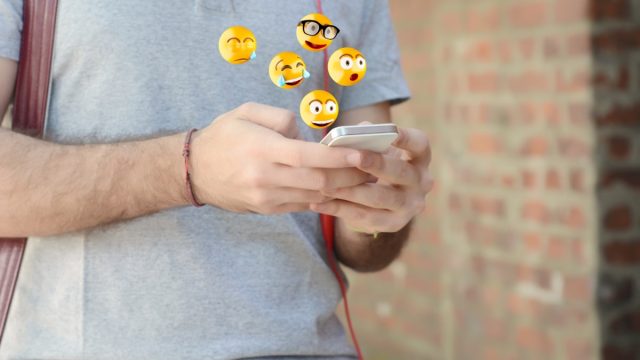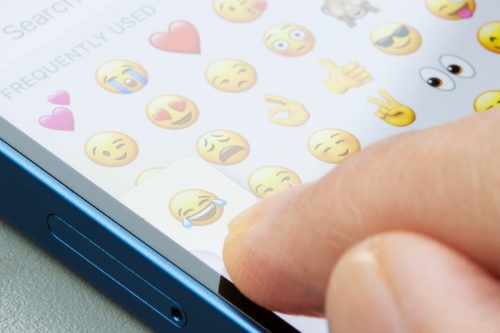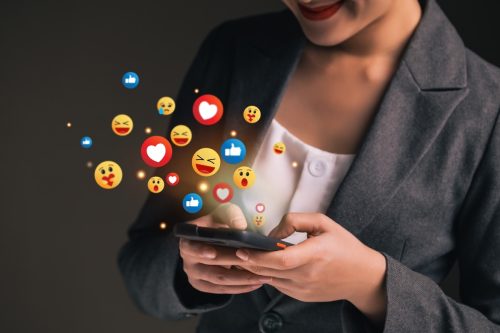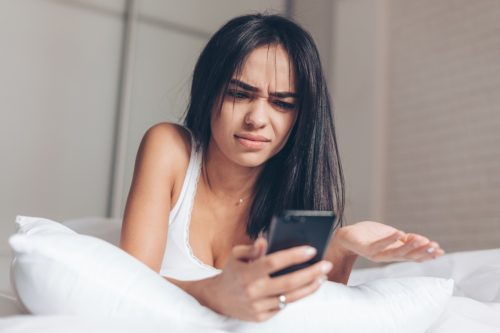5 Red Flags About the Emojis Your Partner Is Texting, According to Therapists
Pay attention to these texting tendencies, psychologists and counselors say.

Whether you like it or not, texting has become a key method of communication. If you do text often, chances are you're corresponding with your partner or someone you're interested in dating—and probably using emojis. As the name suggests, these little images are intended to express emotion: You might use the crying laughing emoji when something's really funny, or if you keep up with emoji trends, you'll use the skull when a joke is so hilarious, you're "dead." Experts say that emojis can be helpful when chatting with your partner, in particular—but certain emoji habits should send up red flags.
"Like most nonverbal communication, emojis can be a good way to flirt and to supplement the nonverbal signals that are missing in plain text, giving richer meanings/emotions to the text," Beth Ribarsky, PhD, professor of interpersonal communication at the University of Illinois Springfield, tells Best Life.
"They can also be a form of bonding and ritualistic communication—helping solidify the bonds, connections, and/or memories you have with your partner," she adds. "For example, when my partner and I are away from each other, we often text each other a popping champagne bottle emoji with our 'goodnight' text—as a reference back to a funny incident involving a wine cork that happened when we first started dating."
On the flip side, clinical psychologist Carla Marie Manly, PhD, says that emojis that "signal chronic indifference, irritation, or anger" are the ones that you need to keep an eye out for.
With this in mind, there are a few key indicators to be aware of. Read on for five emoji habits that therapists say could be cause for concern.
READ THIS NEXT: 5 Things You're Not Texting Your Partner That Therapists Say You Should Be.
1
They use the thumbs up emoji too often.

One of the most polarizing emojis is seemingly well-intended: the thumbs up. In general, this emoji indicates that something "sounds good," and occasional use is just fine. But if your partner relies on this emoji, it could be a sign of indifference.
"A thumbs up emoji can be a quick way to indicate that you're on board with what your partner has said, but if your conversations become a string of thumbs up responses, it might be a sign your partner is not truly engaged in what you are saying," Ribarsky says.
Divorce attorney Corri Fetman echoes this and says your partner might send a thumbs up because they aren't paying attention. "This emoji is used too often to end the conversation because they are tuning the other person out," she says.
2
They substitute emojis for clear communication.

Texting doesn't allow for the face-to-face aspect of an in-person conversation, Manly notes, which also eliminates messages we communicate through our body language, tone, and eye contact. Messages can easily be misinterpreted, and if your partner is using emojis to avoid explaining what they really think or feel, things can get even more confusing.
"People are increasingly relying on emojis rather than expending the effort to communicate with words. The result is a tendency towards less meaningful conversations, as emojis lack the ability to convey complex emotions and nuances that come with verbal communication," Courtney M. Hubscher, MS, licensed mental health counselor and therapist at GroundWork Counseling in Orlando, Florida, says.
"When it comes to a romantic relationship, this can be particularly damaging as emojis are often seen as a substitute for communication, leading to misunderstandings and an avoidance of deeper conversations," she adds.
As a result, you and your partner will likely feel disconnected, increasing the chances of a "relationship breakdown," according to Hubscher.
READ THIS NEXT: 8 "Small But Toxic" Things to Stop Saying to Your Partner, According to Therapists.
3
They use too many emojis.

Just as a single thumbs up emoji may feel dismissive, if your partner overdoes it on the emojis, proceed with caution.
An overload of hearts or smiley faces can make it difficult to understand what your partner is truly trying to say, according to Candace Kotkin-De Carvalho, LSW, LCADC, CCS, CCTP, clinical director at Absolute Awakenings.
This habit goes hand-in-hand with a tendency to use emojis instead of words to communicate. "In some cases, a partner may use emojis to avoid tough conversations or shy away from difficult topics," Kotkin-De Carvalho adds.
4
They send flirty emojis to other people.

It's only natural that your partner will be texting other people, whether that's friends, family, or coworkers. Emoji use in these conversations is completely normal, but certain emojis should be reserved for your relationship.
"It's important to factor in personality and context when looking at emoji use. In general, emojis themselves are not red flags—what matters most is how the emojis are used within a relationship," Manly tells Best Life. "For example, a 'heart' emoji signals love between friends or partners. However, a 'heart' emoji sent from a married boss and a co-worker likely signals emotional or physical infidelity."
Manly also says the purple devil emoji is one that could have a dual meaning—indicating anger or sexual innuendo. If your partner leans toward the latter, you'll likely want to set some boundaries about using that emoji with other people.
"When looking at emoji use, it's more important to be concerned with the quality of the underlying relationship, any abrupt shifts in communication, and any chronic patterns that indicate emotional disconnection," Manly stresses.
For more relationship advice delivered straight to your inbox, sign up for our daily newsletter.
5
They don't use appropriate emojis in response.

With words, you can be pretty clear about what you mean, even if you can't perfectly convey your tone over text. You can't say the same for emojis—and if your partner sends an odd emoji in response, something might be amiss.
"Emojis that send an incongruous message might raise some concerns," Ribarsky says. "For example, if you get an 'I love you' text with a rolling eye emoji, it might speak to frustrations or other underlying issues."
Manly shares a similar sentiment. "If you ask a partner to meet you for dinner and receive a 'shrugging' emoji in response, the 'shrugging' emoji may be a sign of disinterest in the relationship or sheer overwhelm due to a long day at work," she explains. "The goal, in this case, would be to talk with your partner about the meaning of the emoji use."
This also applies if you regularly send loving messages and you receive something like a frowning face or that aforementioned shrugging emoji in response. "It's important to have an honest discussion to get to the root of these 'red flag' responses," Manly says.





















